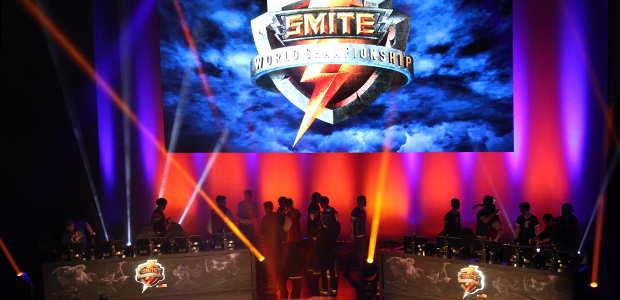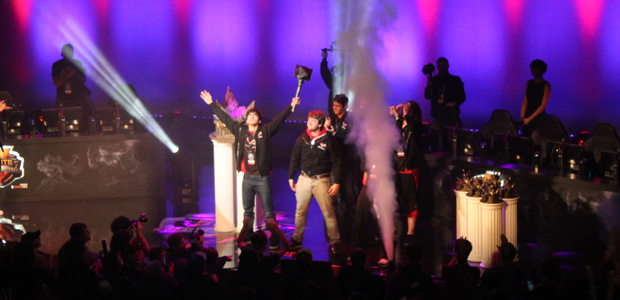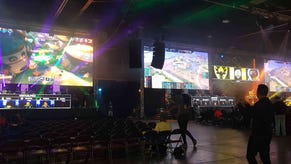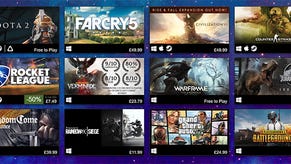Dote Night: Smite's $1m Prize Pool Cap And What It Means For The Pro Scene
Mo money mo [pro gaming] problems
Earlier today game developers Hi-Rez announced that they would be capping the prize pool for their Smite World Championships at $1m. Smite [official site] is an over-the shoulder MOBA whose character roster is populated by the gods of various religions. Its inaugural World Championship took place earlier this year in Atlanta, Georgia with a total prize pool of $2.6m, the majority of which was crowdfunded. I got in touch with Hi-Rez president Stew Chisam to dig into why he thinks the cap will benefit the professional gaming scene:
The subject of eSports prize pools has been on my mind recently. Primarily it's because of The International's prize pool which has just sauntered past the $15m mark and which, if previous tournaments are anything to go by, will see a handful of teams picking up a huge amount of money while teams further down the rankings – those who are just starting or are further down the pro rankings at the moment – see none of that*. Looking at the Smite World Championships I wondered if Hi-Rez were simply going to adopt Valve's strategy. They had their own spin on it – the crowdfunding bit involved an Odyssey and a series of escalating rewards – but the basic shape was recognisable.
But it seems that they've been having a rethink, and that rethink involves spreading the cash flow out a bit more evenly, both in terms of teams and in terms of when those dollops of cash are available throughout the year. According to Chisam the success of the previous SWC crowdfunding and the growth of the game in general meant the money available for season 2 of Smite ran into the millions. The question was, "Given that we have millions in eSports prizing for season 2, is it best to give that out at a single event, with nearly half to a single team? Or is it smartest to spread that out over more events throughout the season, and allow more teams and players to share in the prizing?"
He goes on to answer his own question: "We talked with a lot of Smite pro-players, Smite team owners, and also experienced people from the eSports industry outside of Smite. And we decided that, in order to grow our sport over the long haul it is important that we allow as many people as possible to make a living pursuing Smite eSports. Spreading our prizing out over more events and to more players allows this to happen."
In January 2015 the majority of the funding for the $2.6m SWC prize pool came from community contributions. Hi-Rez put in $0.6m and the community offered up $2m. Profits from the crowdfunding elements are also part of why Hi-Rez has millions to invest in prizing this season. My next question to Chisam is whether the introduction of a prize pool cap means they're rethinking community contributions.
"We definitely still believe in crowdsourcing and that is very much still a part of our strategy. It’s only June, and we started Season 2 crowdsourcing about two months ago. We’ve already raised around $500,000 in community contributions so far for Season 2 eSports, through our SPL Season Ticket, our SPL Team Treasure Chests, our Summer of Smite event and the special Cog Scylla skin (which celebrates last year’s World Champions [Cognitive Prime] and is funding a tournament in San Jose later this year).
"One change you’ll see in our crowdsourcing approach this year versus last year is a more direct tie in to eSports - as we have seen very clearly that this helps promote and grow the sport and make the casual fan of the game more interested in eSports."
As a for-instance, Chisam brings up the pro league's digital season ticket which lets you earn points (and rewards) for correctly predicting the outcomes of pro matches. Apparently the pro league viewership doubled after its introduction. He also mentions team treasure chests - in-game purchasable items which contain themed cosmetic items and other digital bits and bobs - which encourage teams to promote themselves (and the game):
"Most of the major sponsored teams in our Smite Pro League now have a Team Treasure Chest within the game itself. For example, there is a Fnatic Treasure Chest that contains a Fnatic-themed Anhur skin, a Fnatic-themed ward skin, and several other highly valued skins (such as the Dark Lord Sun Wukong skin). Every time someone rolls one of these chests -- we contribute some money directly to the teams, and additional money to the general prize pool for Season 2 eSports."
Chisam has mentioned that the decision to rethink prizing wasn't solely a Hi-Rez one. Pro players and teams had also provided feedback via a survey to say they would prefer a different approach. The company shared some of the responses with me. Bear in mind they'll have been vetted before they were sent out but they include statements like:
"Top-heavy prize pools have harmed eSports in the past because it stagnates the growth of newer teams," and "It's easy to support the best team in the world because they'll most likely qualify for their region's LANs almost every time. What we want here, though, is to reward the best team WHILE giving opportunities to smaller teams to rise and create new rivalries/bring new strategies and playstyles to the community."
Without knowing which teams offered which responses it was hard to get a feel for whether this was a concern shared across all tiers of team or whether the best of the pro leagues would have been content to keep the status quo. On this subject Chisam points to the benefits of stability.
"Clearly, the very best teams and players could make less in this scenario -- but I think they also realize that anyone can have a bad day and that the old structure could mean truly huge swings in their annual income just between the difference of finishing first or second in a single event. This gives them a more reliable income stream while still rewarding them for being the best."
David Fry is the owner of Cognitive Gaming. During the last SWC he had two teams in the competition – Cognitive Prime who finished in first place and Cognitive Red who came third. At one point, Cognitive had also owned the second placed team, Titan, back when they were called Aquila.
"I believe there are pros and cons with any way you can do prizing," he responded when I asked if the reworking of Smite prize pools was a good thing. His main concern is that players be rewarded for their investment in the game, both in terms of play time and in related areas like helping grow the community.
"I came from professional sports, where every player is paid to compete at the level that is both necessary and needed to grow the sport in its entirety. For this reason I believe that you can't make everyone happy and the teams on top might not be, even if the guard changes or what have you. Just being able to have financial stability in some fashion when you are playing a sport full time actually alleviates a lot of the unnecessary pressure [on] a professional player. Not everyone can be on the best team, that being said; every professional is still working full time to be good enough to compete. That peace of mind actually makes for better plays because it's not another problem lingering at the back of your mind when you're competing."
While we're on the subject of Cognitive teams, Cognitive Prime are the team who pocketed $1.3m at the SWC. As a top tier team, under the restructure their potential winnings at single events would go down a little. According to Chisam "They understand what we are trying to achieve here with these changes, though."
To get a better picture of what the money could theoretically achieve, and the disparity between the prizes for placing first or third I go back to David Fry. Cognitive Prime went on to sign with Cloud9 and Cognitive Red are now Team SoloMid but given they were under Cognitive's aegis when they won $1.3m and just under $400,000 respectively I ask how helpful those sums of money would have been relative to one another.
"Cloud9 was paid enough money to survive for roughly four to five years comfortably if they take care with their money, whereas TSM has enough to sustain maybe three years being decently frugal. While I am happy for them, some of the teams that dedicated upwards of two years to get to Worlds fell slightly short. Made maybe five grand over the course of two years, so they turn to streaming and other revenue that can adversely affect their gameplay at times. If everyone made decent wages in prize earnings, supplemented by sponsors or teams, then you would have a much more stable system and players would fight that much harder to get and stay there."
The point about the money being used sensibly or living frugally is worth highlighting. When a team wins a huge lump sum, how it's divided up and what the players do with their share is important. Do you bury your money nuts in preparation for the pre-gaming winter or do you spend them all on an acorn-shaped racecar and a house made from gold? I think most people would go for a bit of both, but if your aim is to build a sustainable pro scene, as it is with Hi-Rez, then would it not make more sense to offer other forms of prize? Perhaps paying the rent on a team house for a year (and thus encouraging wildcard teams to stick together) rather than risking the money going elsewhere. Or maybe using cash prizes but to reward things like good sportsmanship?
Chisam's answer is that the team treasure chests and their direct-to-team payment element are a step in that direction but that "We’ll definitely continue to look creatively in this direction."
The other option when it comes to offering regular cash and sustainability is salaries. League of Legends takes that approach with its top tier pro teams and their eSports scene is pretty stable. Given Chisam has already mentioned players making a living through Smite I ask whether player salaries from Hi-Rez are another possibility.
"I think we can do a hybrid system that still rewards success and on-going participation, but helps people have a more steady and predictable flow of income through the year," he says. "Take our Summer Split for the SPL for example. The last place team in the region, which may have won only 1 out of 14 games, is still guaranteed a sizable minimum payout for the season (around $10,000 for the split), and that will go up in the Fall Split, based on our expected crowdsourcing. It’s much more modest than the top teams, but ensures they get a decent reward for their effort. This encourages them to play more in the future.
"So right now, we are not giving salaries but are trying to make sure players know they can count on a certain amount of money as long as they stay dedicated to the sport and playing at a level that keeps them in the Pro League."
I also ask Team Dignitas's managing director, Michael O'Dell about how Smite measures up to other eSports on the viable career option front. Dignitas fields teams across a wide range of eSports so O'Dell is well-placed to note how the game holds up. His response is pretty positive:
"I think Smite are doing very well and the fact they have been building the game for several years and supporting the community has created pro players naturally. The bigger the game gets and the more viewership it obtains will mean that more players will come through and will start making money doing something they love."
It's at this point that I bring up The International. Has the success of the crowdfunding for that event (regardless of any changes for TI6 and for the upcoming Dota 2 professional events lineup) affected how Hi-Rez thinks about creating or managing prize pools for its eSports events in any way?
"Crowd-sourcing is amazing and we still continue to believe strongly in it. What Valve has done with The International is clearly a huge-scale example of that. I think all of our lessons learned over the past year are in how to optimally structure our crowd-sourcing, our events and our prize distribution to help grow our sport and allow more players to support themselves by playing Smite.
"I think each game and each eSport is a little different. So what makes sense for Dota 2 may not make sense for us. We think that for Smite the healthiest thing to grow our sport over the long haul is to spread our prize pooling over more events more evenly, while still having a very meaningful World Championship prize pool that I think anyone would be thrilled to take home!"
My last question is on responsibility (I'm fun like that, it's why I get invited to so many parties). Specifically, I want to know how much responsibility Hi-Rez can take for whether Smite survives or, indeed, thrives as an eSport. I direct it at Chisam, O'Dell and Fry.
O'Dell tends to put the publisher at the top of the responsibility list. "I think the publishers must lead and also must police their own eco system that they have created. The professional teams must of course also look after the eco system but the game makers are the umbrella over it all ultimately."
Fry praises Hi-Rez's current absorption of most costs for the events it hosts (travel for players, accommodation, catering and so on) pointing out that there's not much that an organisation would need to stump up for outside player salaries and other contractual obligations. He adds that this adds that third party tournament organisers struggle in the current ecosystem. "I do believe that this [responsibility] should actually stay on Hi-Rez because there's no real way to be a tournament organiser and make money in the game. There's no way to do specific tickets and such, so hosting a small tournament is easy, hosting a larger one that does bring potential financial gain for a tournament organiser outside of Hi-Rez is much harder to do."
Fry continues, "Not going to lie, [it] costs a lot of money to put on tournaments, LAN or online for the higher-end teams that get good viewership to potentially convince a sponsor into giving you money for the event. That is, I guess, one thing I like from another eSport other than Smite, Dota 2's old system made it relatively easy for a good tournament organiser to make money as well. More overall sustainability but a possibly unnecessary expense as Hi-Rez working to fix the top level of competition that they do spend so much on is more of what they should focus on for the time being."
And Hi-Rez's own view?
"We view the long-term sustainability of the sport as a shared responsibility between Hi-Rez, the Smite Community and the Smite eSports players and organizations," says Chisam. "As the sport grows, we are finding that we can make it sustainable through a combination of sponsorships, crowd-sourcing and engagement by other companies and organizations that are also interested in growing the sport."
The general mood is one of optimism. Whether the approach bears fruit is now a matter of waiting and seeing.
*This could all change as Valve announce more of their plans for structuring a pro season around a series of events











